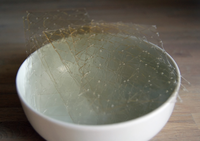
Photo from wikipedia
This study comprehensively reviewed the effect of controlled enzymatic hydrolysis on the bioactivity of pulse protein hydrolysates (PPHs). Proteolysis results in the partial structural unfolding of pulse proteins with an… Click to show full abstract
This study comprehensively reviewed the effect of controlled enzymatic hydrolysis on the bioactivity of pulse protein hydrolysates (PPHs). Proteolysis results in the partial structural unfolding of pulse proteins with an increase in buried hydrophobic groups of peptide sequences. The use of PPHs in a dose-dependent manner can enhance free radical scavenging and improve antioxidant activities regarding inhibition of lipid oxidation, ferric reducing power, metal ion chelation, and β-carotene bleaching inhibition. Ultrafiltered peptide fractions with low molecular weights imparted angiotensin-I converting enzyme (ACE) inhibitory effects during in vitro simulated gastrointestinal digestion and in vivo conditions. Ultrasonication, high-pressure pretreatments, and glycosylation as post-treatments can improve the antiradical, antioxidant, and ACE inhibitory activities of PPHs. The electrostatic attachment of pulse peptides to microbial cells can inhibit the growth and activity of bacteria and fungi. Bioactive pulse peptides can reduce serum cholesterol and triglycerides, and inhibit the formation of adipocyte lipid storage, allergenic factors, inflammatory markers, and arterial thrombus without cytotoxicity. The combination of germination and enzymatic hydrolysis can significantly increase the protein digestibility and bioavailability of essential amino acids. Moreover, the utilization and enrichment of bakery and meat products with functional PPHs ensure quality, safety, and health aspects of food products.
Journal Title: Critical reviews in food science and nutrition
Year Published: 2022
Link to full text (if available)
Share on Social Media: Sign Up to like & get
recommendations!